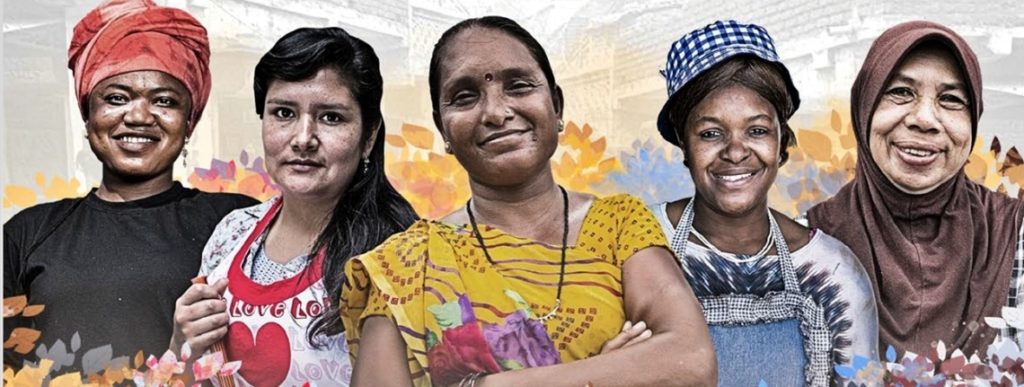Subscribe to our E-Letter!
Subscribe to our e-mail and stay up-to-date with news and resources from street vendors around the world.
Oksana Abboud, the International Coordinator of StreetNet International, participated in the Cities Alliance webinar “Learning from Cities to Advance Gender Equality—The new EU Gender Action Plan in light of COVID-19”, on June 26, 2020, to share how membership-based organizations of informal economy workers can promote women’s rights in urban spaces, drawing on the experience of StreetNet International and its affiliates.
Oksana presented the unique challenges faced by informal economy workers in cities, who make up 44% of all workers. Despite their relevance and contribution to urban life, economic and urban planners seem to view informal workers, and street vendors in particular, as problematic, perceiving these workers as a source of crime and deregulation. However, this criminalization does not take into account the value and dignity of street vending work, as it is an alternative to thousands of people that the formal employment system is unable to absorb and who legitimately go to the streets to sell goods to earn the livelihood of their families in a very honest way.
The bad reputation of urban informal traders does not match reality and contributes to further marginalization and exclusion. Oksana stressed that most informal economy workers are trying to survive without any form of social or legal protections, basic infrastructure, public procurement, business development services, tax relieves schemes, etc.
In addition to this, urban informal traders must also deal with the daily threat of violence, harassment, bribes, confiscations, and evictions by local authorities and law enforcement bodies. These workers are not only forced to rely solely on themselves, but they are also persecuted for daring to survive by working in the informal economy.
COVID-19 was disastrous for all urban informal economy workers. The lockdowns and quarantine restrictions resulted in many workers suddenly finding themselves without work, income, or even food.
For the street vendors and informal traders that make up StreetNet International, the negative impacts of COVID-19 were intensified due to their working and living conditions. Many survive on daily income, have no social protection, and have limited access to health care and other public services (such as clean water).
Most street vendors were faced with an impossible choice: either to stay at home and starve or return to work in the streets with the looming threat of the pandemic. Those who were forced by circumstances to continue working were still persecuted by authorities and suffered brutal evictions, even though these workers had no other choice in practice but to risk infection in order to survive.
COVID-19 did not just lead to greater violence in the streets. Reports of gender-based violence increased, including among informal economy workers.
Women
street vendors are more exposed to different kinds of violence and abuse,
because they not only have to deal with the threat of violence at home (the
most dangerous place for women, according to a study by UNODC), but they are also targeted by authorities
and their precarious working conditions offer no protection against harassment
and abuse.
It is no
wonder, then, that whenever crisis hit, women are most likely to lose their
jobs than men and have a harder time recovering and re-entering the labor
market.
Streets vendors and cross-border traders associations mobilized fast at the start of the COVID-19 pandemic crisis. Where it was possible and some relationships had been set up between the street vendors’ organizations and local authorities, they quickly adapted their work to fit new health requirements and looked for ways to support each other. As Oksana stated, street vendors are “innovative and creative” and found ways to work while complying with required health care guidelines. Still, many continued to suffer from the restrictions imposed by the governments.
That is why StreetNet International and its affiliates came up with a list of clear and concise demands for governments, based on the principle of Nothing For Us Without Us:
StreetNet International is also involved in the Global Solidarity Platform and respective campaign 2 Billion Strong – Recovery Starts With Us, led by WIEGO – Women In Informal Employment: Globalizing and Organizing. The statement of the Global Solidarity Platform calls for a transformation, a new model of work that “recognizes and values all forms of work”, aligned with the ILO Recommendation 204.

StreetNet
also started to share on social media inspiring stories of women street vendors
from several countries, and how they became leaders for the rights of informal
economy workers, demonstrating how they are key actors for change on several
levels (labor rights, women’s rights, economic development, etc.)
You can see a short version of Oksana’s presentation here:
StreetNet International is mobilizing all their affiliates and supporters to promote the rights of street vendors, hawkers, and cross-border traders during COVID-19. Follow us on Facebook and Twitter, and amplify our message.
Registered as a nonprofit organization in South Africa.
PBO 930030585
Content license: CC BY-SA 4.0
Physical address 45 Claribel Road Windermere Durban 4001, South Africa

By entering your personal data and clicking “Suscribe,” you agree that this form will be processed in accordance with our privacy policy. If you checked one of the boxes above, you also agree to receive updates from the StreetNet International about our work